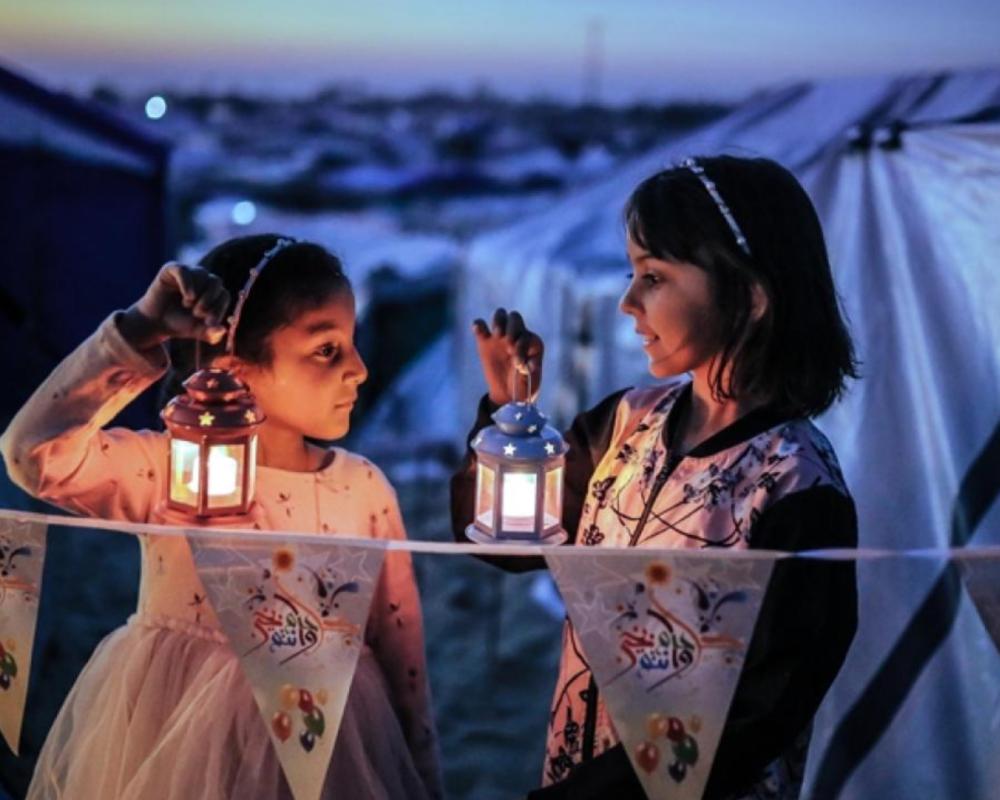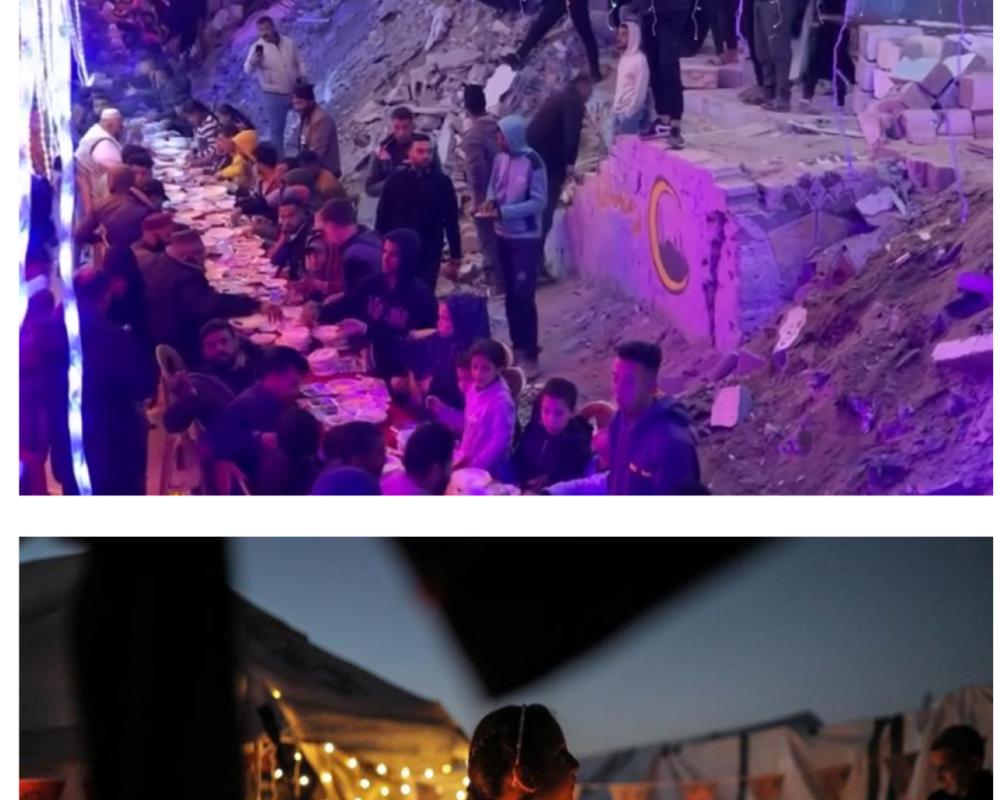
GAZA CITY /PNN/
As the holy month of Ramadan begins, the atmosphere in the Gaza Strip is starkly different from previous years. Under the weight of a prolonged blockade and widespread devastation left by Israeli military operations, Palestinians in Gaza are clinging to the traditions of Ramadan with unwavering determination.
Despite the widespread destruction from the most recent conflict, the first night of Ramadan unfolded in Gaza with a mix of spiritual reflection and resilience. In Khan Younis, in southern Gaza, the traditional musaharati — the pre-dawn drummer who wakes families for suhoor — made his rounds among the rubble, calling on residents to prepare for the pre-fast meal. His voice echoed through streets lined with makeshift tents sheltering displaced families, some of which were flooded by heavy rain. The sight underscored the persistence of life amid despair.
Scattered strands of coloured Ramadan lights flickered across parts of the devastated enclave, offering a glimmer of hope to residents who continue to observe the holy month despite dire circumstances. Children clutched small Ramadan lanterns, their eyes reflecting both joy and the weight of hardship.
Years of conflict and siege have left Gaza’s infrastructure in ruins, with little access to clean water and electricity. Yet the start of Ramadan saw families preparing their suhoor meals, finding ways to uphold the traditions that distinguish the holy month in Gaza.
"The spirit of Ramadan cannot die," said one resident as he prepared his modest meal by candlelight. “We celebrate despite everything, because this month is about patience and faith.”

As Gaza’s residents face ongoing challenges, the holy month serves as both a spiritual refuge and a testament to their enduring resilience.
Torrential rains swept through Gaza on the first suhoor night, soaking tents that shelter families displaced by the ongoing conflict. Belongings were ruined, and many women and children were forced to flee in search of alternative refuge. However, with little shelter available, many were left exposed to the bitter cold, adding to the misery of a population already grappling with catastrophic living conditions.
Families who returned to the ruins of their bombed-out homes fared no better. Water seeped through cracked walls and ceilings, leaving them vulnerable to both the elements and the harsh realities of life without protection or basic services.
Infrastructure Collapse and Humanitarian Crisis
The relentless conflict has devastated Gaza’s infrastructure, with local officials estimating that nearly 88% of essential services and buildings have been destroyed. Homes, hospitals, and water and electricity networks have been severely damaged, leaving the population without the most basic necessities.
Emergency teams, operating with limited resources, are struggling to mitigate the flooding. Despite repeated appeals from local and international agencies for the entry of essential equipment and humanitarian aid, Israeli restrictions continue to delay the delivery of life-saving supplies. The slow implementation of ceasefire agreements has exacerbated the crisis, leaving the population in limbo.
Food shortages, lack of clean water, and dwindling humanitarian aid are pushing Gaza deeper into a humanitarian catastrophe. Health and psychological conditions among displaced families are deteriorating, with children and the elderly particularly vulnerable.
"We are trying to survive, but every day the struggle becomes harder," said Ahmed Abu Salah, a father of four whose tent was submerged in rainwater. “Even in Ramadan, there is no relief from this suffering.”
As Gaza marks the beginning of Ramadan amid destruction and despair, the resilience of its people remains a testament to their unwavering spirit, even as the world watches their plight unfold.
The humanitarian crisis in the Gaza Strip is deepening, with the deteriorating health situation compounding the suffering of thousands of displaced families as the holy month of Ramadan begins. Despite efforts by local and international humanitarian organisations, chronic shortages of medicines and medical supplies are posing a grave threat to the population, especially with the rising number of injuries from ongoing conflict and worsening health conditions.
Medical facilities across Gaza are struggling to cope, as essential medicines and equipment remain scarce. The International Committee of the Red Cross has reported that displaced families lack basic necessities such as blankets and warm clothing, leaving them vulnerable to cold-related illnesses. Children and the elderly are particularly at risk, as the combination of harsh weather, overcrowded shelters, and inadequate medical care exacerbates the already dire health crisis.
Several humanitarian and human rights organisations have warned that Gaza is on the brink of a catastrophic health emergency if the situation remains unchanged. According to health officials, the blockade and ongoing restrictions on the entry of medical supplies and humanitarian aid have severely crippled the healthcare system.
Calls for Urgent Action
Human rights groups have called for urgent intervention, stressing that the continued Israeli blockade is a key factor in the worsening crisis. The limited access to essential food, medicine, and relief supplies is threatening to push the displaced population into even greater suffering.
"This crisis is not only about destruction — it is about survival," said Mahmoud Hamada, a spokesman for a coalition of rights groups in Gaza. “Without immediate intervention, we fear the worst is yet to come.”
Resilience Amid Despair
Despite the mounting challenges, the people of Gaza continue to cling to their traditions and faith. Families gather in makeshift shelters for iftar, breaking their fast with whatever little food is available. Children light small Ramadan lanterns, offering a glimmer of hope in the darkness of displacement and destruction.
As the humanitarian situation deteriorates, the resilience of the Palestinian people remains unwavering. However, urgent action from the international community is needed to provide life-saving aid and prevent the looming health catastrophe.
Without immediate intervention, aid workers warn, thousands of families could face even greater suffering in the coming weeks, as the conflict shows no sign of easing.